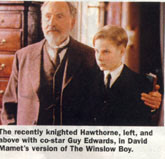












 | After a late start, Sir Nigel Hawthorne's star is well and truly on the ascendant. Helen Barlow spoke to him in France. |
It is one of the funniest moments in Cannes. Sir Nigel Hawthorne drags himself away from a celebrity lunch to come over to our interview table, only to be followed by the ever-bubbly Salma Hayek, an obious fan.
The 70 year old British actor fails to recognize the Mexican fireball, though he seems bemused by it all, especially when Hayek leans across and her voluptuous breasts nearly fall out of her dress and into his face. As she beats a retreat in her tight slip of a dress, Hawthorne grins and quips "Nice bum!" in his clipped British tones.
The uproarious laughter that ensues (unbeknown to Hayek) is made all the more funny by the fact that Hawthorne is gay, and that his partner of more than 20 years, Trevor Bentham, is sitting at a table nearby.
We are here to discuss Hawthorne's film, The Clandestine Marriage, an 18th century romp, but the real reason I wanted to meet him was David Mamet's The Winslow Boy, my personal favourite at the Festival.
Based on Terence Rattigan's 1946 play, it contains some of the elements of the 1950 film version and tells of a father (Hawthorne) who sticks by his son's version of the truth when the son is expelled from a pompous naval academy. He then mounts a court case to prove his son's innocence.

"They rang me up and said 'We want you to play the father of the Winslow boy'," Hawthorne recalls, "and I said 'Oh, pleeease, not that old thing again'. And they said, 'It's directed by David Mamet', so I said, 'OK, book me!'"
Hawthorne, who has directed on stage, now wants to try his hand at directing movies, and he says Mamet was a wonderful teacher. "He has a wonderful mind. When you work with him you are part of his family and he teaches you about movies and he teaches you about scripts."
Starring with Hawthorne is Rebecca Pidgeon, Mamet's adored wife and constant collaborator. According to hawthorne their relationship had a positive effect on the film. "There's an electricity between them on the set and it's very gentle. He just touches her or takes her hair or kisses her as she's passing by; it's lovely to watch.
As seasoned stage actor, Hawthorne became a household name at 50 in the BBC series, Yes, Minister. After receiving the Olivier Award for his stage performance in The Madness of King George in his early 60s, he appeared in the film version of the play, received an Oscar nomination and was suddenly the flavour of the month - "discovered" at 65.
This meant his personal life was up for grabs, but fortunately things have settled down. "Yes, perople leave me alone," he says. "But I get very fierce now if they ask unnecessary questions. I feel it's nobody's business, you know, and always have done. I mean, Trevor and I have been going to public ceremonies together for 20 years, and it was only the occasion of the Acadmey Awards that made the press decide that we were to be outed and to be a news item."
"It made me angry at the time that we should be treated like some sort of pariahs, when they knew perfectly well what the situation was, and what did it matter anyway? You know, it wasn't as if we were young bloods or anything like that."
Still, you can't keep this septuagenarian down. In Tokyo in Auguest he will begin a Japanese production of King Lear which will also go to Britain. "We bring it to Stratford for the millennium, so I will play King Lear over the year 2000."
But that will be Hawthorne's final play, or so he says. "The theatre's a hard mistress, you know, and I'm 70 now, so I think I'll do King Lear and that's going to be it. Then, if I'm still alive - which I may not be when Lear's finished - I'll come back and do a film."
